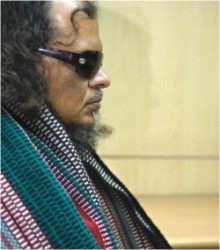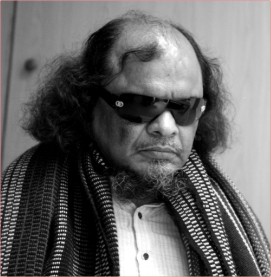|  Cover Story Cover Story
From Manikganj
Songs of the Baul Shajahan Munshi
Saba El Kabir
Looking at the folk music traditions of Bangladesh would reveal not a few insights into our socio-cultural legacy. After all, we are talking about music that is of the people, for the people and by the people; what better way can there be to capture the true spirit of the times - free of the biases of the few, replete with the biases of the many. These songs are expressions of the hopes and ambitions, the concerns, the ideologies of the masses; and while they are most certainly influenced by our classical roots, they are by no means defined by it, and as such are much more aware of and responsive to - the vicissitudes of their times.
But the times they are a-changing. With the increasing cultural domination of the urban centers and their ability to transmit mass produced culture to all corners of the nation, these folk arts have lost some of the luster of old, and are facing stiff competition for hearts and minds of people that once flocked so readily to them. There has been somewhat of a revival in recent years however, with artistes experimenting with contemporary interpretations the folk tunes. Habib's brand of folk-pop a heady mixture of folk infused with syrupy sweet pop have become a regular fixture of the urban music charts. And then there are bands such as Bangla and Lalon, following up the pioneering work of Feedback, with their own interpretation of folk music, with a bit more rock-credibility.
 One of the most recognizable groups from the gamut of Bangla folk music, and a group whose work has been the key source of inspiration for many of these contemporary folk-influenced artistes, are the Bauls. The Baul traditions are a confluence of Hinduism, Buddhism, Bengali, Vasinavism and Sufi Islam, yet distinctly different from them all. The resultant medley of spirituality and mysticism, and the associated lifestyle, is very fertile grounds for some highly creative and somewhat eccentric music. The Baul tradition is in fact more a way of life with its own lifestyle, its own philosophy, with the music being just a part of the greater whole. Their music and way of life have influenced a large segment of Bengali culture, and in particular their influence on the compositions of Nobel Prize laureate Rabindranath Tagore is oft touted. In 2005, without the need for any form of Internet picketing, the Baul tradition was included in UNESCO's list of "Masterpieces of the Oral and Intangible Heritage of Humanity". One of the most recognizable groups from the gamut of Bangla folk music, and a group whose work has been the key source of inspiration for many of these contemporary folk-influenced artistes, are the Bauls. The Baul traditions are a confluence of Hinduism, Buddhism, Bengali, Vasinavism and Sufi Islam, yet distinctly different from them all. The resultant medley of spirituality and mysticism, and the associated lifestyle, is very fertile grounds for some highly creative and somewhat eccentric music. The Baul tradition is in fact more a way of life with its own lifestyle, its own philosophy, with the music being just a part of the greater whole. Their music and way of life have influenced a large segment of Bengali culture, and in particular their influence on the compositions of Nobel Prize laureate Rabindranath Tagore is oft touted. In 2005, without the need for any form of Internet picketing, the Baul tradition was included in UNESCO's list of "Masterpieces of the Oral and Intangible Heritage of Humanity".
Although Baul artistes have never quite managed to gain a meaningful foothold in the our urban music scenes, there have been a few in recent times who have been bucking the trend. One of the most prominent of these artistes is Shahjahan Munshi. Visually handicapped folk singer and songwriter Baul Shahjahan Munshi has been a performing folk artist for over four decades. He has regularly performed in Manikganj all his life but his presence in the more established urban music circuit has been since the early 80s. In the early 90's, at the invitation of the French government, he took his sound to France where he recorded the album Chants Mystiques Des Bauls du Bangladesh, and performed at a series of concerts in Paris and Lille. His latest recorded album, Ek Jona, came in September, 2009.
We caught up to him recently to talk him about his music, his life and everything in between.
Tell us about how you got into music.
By the time I was 14 I had gone almost completely blind. I was lonely, and didn't really get on with anybody too well. Most of the time, I would just keep to myself and stay at home. One day I heard somebody playing a dotara in the distance, and I was instantly taken by the sound of it. I made my way to where the sound was coming from. By the time I got there, the man had stopped playing and had gone off somewhere, leaving the instrument behind. I picked it up and started plucking the strings. The strings must have been very rusty, and I ended up breaking a string. The man who owned it returned, dished out some abuse, and I took in without responding. All I could think of was that I needed to get my hands on one of these again. Sometime later, I found one somebody had abandoned. I fixed it up and started playing around with it. By the grace of god, I found I had a natural aptitude for it, and I could play my first tune soon afterwards.
Who did you learn your music from?
I am mostly self-taught. Of course I had some mentors correcting my mistakes, helping me get better, but I mostly learned by going out there and listening to as much music as possible.
When did you realize that you were getting recognized for your music?
After independence, I would perform frequently in my village at various festivals. At one point, I could sense people enjoying my performances. That's when it hit me.
How would you describe your music?
It is really heard to be totally objective about music. For me, how the music communicates to each of us a very personal matter and is different for everyone.
 Tell us about your time in France. Tell us about your time in France.
I was selected by Alliance France Bangaldesh, and funded by the French government for my tour of France. There I performed in a series of nine concerts, seven in Paris, and two in Lille. I also recorded an album there. There I realized that in spite of all cultural, social, political divides, the essence of music stays the same. It is just a language that is different.
What are your thoughts on the music industry?
We are making good music. But it is very difficult for us. I feel folk forms are under-appreciated, and a little starved for attention, and is very difficult for us to take it professionally.
What can we do to help improve the situation?
It is very important to generate awareness, and increase exposure of the folk forms. I believe if people are exposed it, they are bound to appreciate it more.
Your last album Ek Jona, had a decidedly contemporary sound to it. What is your take on contemporary music?
The contemporary artistes are of course doing good work. But we should not forget our folk roots. It is important that we preserve our folk heritage.
Any new albums coming up?
I am thinking about working on album with more folk-based sound. Let see how it goes.
Photo: Sazzad Ibna Sayed
Copyright
(R) thedailystar.net 2009
|

 Cover Story
Cover Story One of the most recognizable groups from the gamut of Bangla folk music, and a group whose work has been the key source of inspiration for many of these contemporary folk-influenced artistes, are the Bauls. The Baul traditions are a confluence of Hinduism, Buddhism, Bengali, Vasinavism and Sufi Islam, yet distinctly different from them all. The resultant medley of spirituality and mysticism, and the associated lifestyle, is very fertile grounds for some highly creative and somewhat eccentric music. The Baul tradition is in fact more a way of life with its own lifestyle, its own philosophy, with the music being just a part of the greater whole. Their music and way of life have influenced a large segment of Bengali culture, and in particular their influence on the compositions of Nobel Prize laureate Rabindranath Tagore is oft touted. In 2005, without the need for any form of Internet picketing, the Baul tradition was included in UNESCO's list of "Masterpieces of the Oral and Intangible Heritage of Humanity".
One of the most recognizable groups from the gamut of Bangla folk music, and a group whose work has been the key source of inspiration for many of these contemporary folk-influenced artistes, are the Bauls. The Baul traditions are a confluence of Hinduism, Buddhism, Bengali, Vasinavism and Sufi Islam, yet distinctly different from them all. The resultant medley of spirituality and mysticism, and the associated lifestyle, is very fertile grounds for some highly creative and somewhat eccentric music. The Baul tradition is in fact more a way of life with its own lifestyle, its own philosophy, with the music being just a part of the greater whole. Their music and way of life have influenced a large segment of Bengali culture, and in particular their influence on the compositions of Nobel Prize laureate Rabindranath Tagore is oft touted. In 2005, without the need for any form of Internet picketing, the Baul tradition was included in UNESCO's list of "Masterpieces of the Oral and Intangible Heritage of Humanity".  Tell us about your time in France.
Tell us about your time in France.